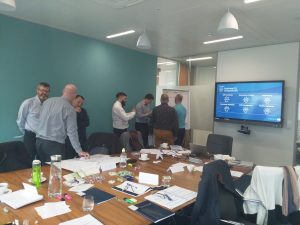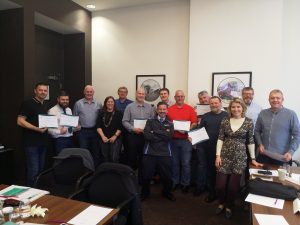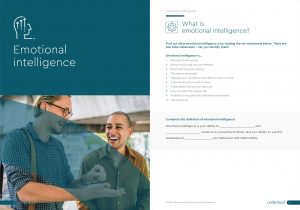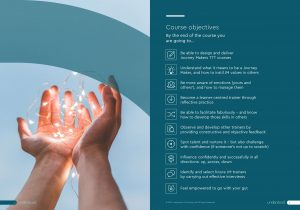
Ten essential training tips to build confident and capable in-house facilitators
By Carolyn Quainton in Training
We’ve just wrapped up a fantastic Train the Trainer certification program with a group of in-house trainers at First Bus. What an incredibly energetic and action-packed four days! You can read more about the course in our case study.


And because we’re buzzing with excitement and fresh ideas, we’re sharing ten top training techniques we used to elevate corporate training facilitation:
1. Developing Emotional Intelligence
Successful trainers need high emotional intelligence. Throughout the course, we focused on building empathy, self-awareness, and authenticity to enhance effective training facilitation skills.
2. Encouraging Self-Reflection
Reflection is essential for learning. We guided participants in assessing their performance and identifying ways to refine their approach in future facilitator training courses.
3. Inspiring a Passion for Learning
We’re dedicated to continuous learning, and we wanted our delegates to feel the same. By sharing books, journals, podcasts, and websites, we encouraged ongoing development beyond the training room.
4. Enhancing Self-Evaluation with Playback
We recorded participants in action so they could analyse their performance. While watching themselves on film felt uncomfortable at first, it proved to be an eye-opening experience!
5. Using Clear and Memorable Models
We avoid unnecessary complexity, but structured models have their place. Our “Four Foundation Blocks of Facilitation” provided a straightforward yet powerful framework for leadership in training delivery.
6. Adding an Element of Surprise
We won’t reveal all our secrets, but a special guest in the training room certainly shook things up! This unexpected twist created a lasting impact and reinforced key lessons.
7. Making Role-Play as Real as Possible
With the help of our talented professional actor, Matt, participants engaged in realistic, challenging conversations. This hands-on role-play in trainer development helped build confidence and practical skills in a safe space.
8. Injecting Energy, Pace, and Interaction
Attention spans are shorter than ever, and training should never feel dull. We kept sessions lively and engaging, using creative delivery techniques to maintain enthusiasm.
9. Creating High-Quality Resources
We believe training materials should look and feel special because we wanted our delegates to feel special. Professionally designed slides and workbooks elevated the learning experience, ensuring our participants were valued.
10. Listening, Learning, and Improving
We actively sought feedback from delegates and HR/L&D teams to refine our approach. As trainers, we’re always learning, just like our participants so taking time to reflect is really important.
“I found this course significantly helpful and relevant to my job. In particular, helping me to understand the difference in delivering a course and teaching someone to deliver a course. It was also helpful in providing communication techniques ranging from staff to management. The interview techniques section was also very useful.” – Attendee.
“The interactive elements of this course were my favourite, both my interaction with others and watching other people.
I found I learned a lot through this.” – Attendee.


These techniques are at the heart of our trainer development programs and interactive training workshops. If you’re looking to refine your coaching and feedback training or take your facilitation skills to the next level, get in touch, we’d love to help!
And don’t forget to explore our website, read our blog, and follow us on LinkedIn to learn more and discover ways to grow a more successful business.


